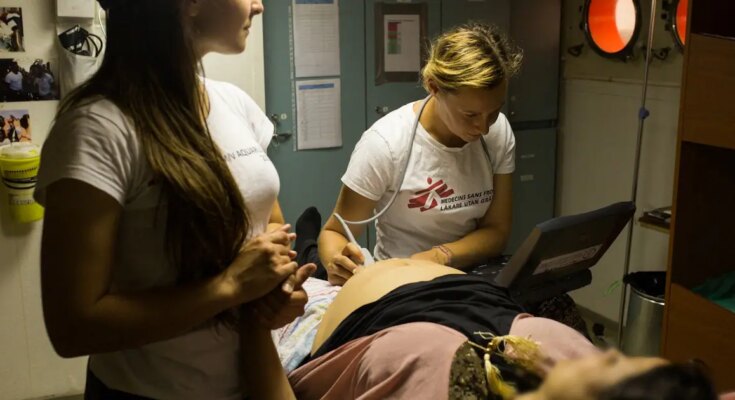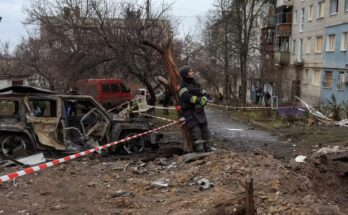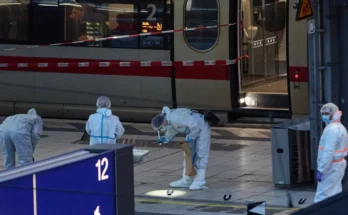Since its founding in 2015, the sea rescue association has saved the lives of more than 42,000 castaways in distress. Testimony, report and meeting in the evening “L’Escale Solidaire” at the Châtelet on December 1.
Amidst the tragedy of migration at sea, there are also moments of life: six newborns have been born on SOS Méditerranée humanitarian ships since the association was founded ten years ago. At the age of 31, Marylène Biquez, a Savoyard based in Marseille, boarded the Ocean Viking three times as a midwife. Her role: watching out for women and children, who are often invisible in the chaos of rescue operations, and offering them up “a safe place so they can finally feel safe.”
Why did you decide to get involved with SOS Méditerranée?
I discovered SOS Méditerranée a few years ago at a conference in Marseille. At the time, I was unaware of the tragedy unfolding in the Mediterranean: I was shocked to learn that countries had withdrawn from their duty to help people in trouble. Faced with this reality, the obvious becomes clear: this is where we must act to respond to this injustice.
What exactly is your role on the ship? from Viking Ocean ?
Midwives are part of a medical team consisting of four people: a coordinator, a doctor, a nurse and a midwife. Our top priority is responding to critical emergencies. We are asked as soon as life is in danger. Once this emergency has stabilized, the following navigation days are devoted to care and support. I then cared for women and children.
Contrary to what one might imagine, there are no serial births on planes. My role is mainly to assess the health condition of the pregnant woman, monitor her pregnancy, and check whether the fetus is in good condition. We have the basic equipment to perform an ultrasound scan, and, if the situation requires it, we request medical evacuation: a European country, often Italy, then sends a boat or helicopter to treat him.
The presence of the midwife on the ship was crucial: it made it possible to bring to light the women who are often forgotten in migration stories. Women use land routes more often than sea routes, where they represent around 16% of people rescued. But their journey is always very intense.
What is the profile of the women you support?
Each brings a unique story, but they all have one thing in common: extraordinary courage. Some of them leave their countries because of gender discrimination: forced marriages, threats of cutting off their daughters, domestic violence or sexual violence. Violence against women is still one of the main reasons people leave their countries, apart from conflict and economic hardship.
How do you care for newborn babies?
Since the founding of SOS Méditerranée, six births have taken place on board, but I have never attended one in person. When a baby is born healthy, the most important thing is to improve the mother-child bond: skin to skin, breastfeeding, safety. We try to preserve this moment of humanity, even in a difficult context like this.
Have you observed any specific trauma related to violence or migration journeys?
Yes, a lot. The women we rescue often experience sexual violence, sometimes in their home countries, but especially during their journeys: while crossing the Sahara desert, in Libya… This violence is almost systematic. Our role is to provide preventive treatment for possible sexually transmitted infections, but also to provide active, non-judgmental and unconditional listening.
And it must be said: this violence did not stop once it arrived in Europe. They continue, in other forms. On the ship, we try to recreate a safe space. Women have their own shelter, separate from men. This space becomes a refuge, a place where they can finally breathe, settle in, and feel a little safe.
How can you offer this sense of security and humanity?
I always start by reminding them that they are, above all, victims, and that what happened to them was not their fault. I told them that we believed them, that they were brave, and that we were here to listen to them. We take the time to show them that the conversation is confidential, to build a bond of trust and safety.
This is not the right place to start therapy: the role of SOS Méditerranée is to save, protect, bear witness. We are like a “sea ambulance”: we act with few resources, just enough to preserve life and restore a little dignity. But we remain available, at any time, for a word, a cure, a presence. Telling them that their words matter, that their person has value, restores a little of their humanity.
Is there a gesture, a smile that you will never forget?
There are lots of them. On board, there are many moments of excitement, real life moments. We spent several days together, we got to know each other, lived together, lived together. When the difficult times of rescue have passed, the meeting becomes more interesting: we find so much in common, so much in common. This is a very human experience.
I hope everyone meets people who inspire, have strength and courage. These meetings enriched me and gave me a lot, even in my daily life on land.


